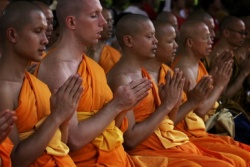Difference between revisions of "Bhante"
Jump to navigation
Jump to search
| Line 1: | Line 1: | ||
[[File:Graph2.jpg|thumb|250px|]] | [[File:Graph2.jpg|thumb|250px|]] | ||
| + | |||
| + | |||
| + | |||
| + | |||
| + | |||
| + | |||
| + | |||
| + | |||
[[Bhante]] ([[Pali]]; {{Wiki|Nepali}}; [[Burmese]]: ဘန္တေ, pronounced: [bàɴtè], [[Sanskrit]]: [[vande]] and [[vandanā]]) is the {{Wiki|polite}} {{Wiki|particle}} used to refer to [[Buddhist]] [[monks]] in the [[Theravada]] [[tradition]]. [[Bhante]] literally means "[[Venerable]] Sir." The {{Wiki|Nepali}} terms for the [[Buddhist]] priestly [[Caste]], [[bare]] and [[bande]], have the same derivation. | [[Bhante]] ([[Pali]]; {{Wiki|Nepali}}; [[Burmese]]: ဘန္တေ, pronounced: [bàɴtè], [[Sanskrit]]: [[vande]] and [[vandanā]]) is the {{Wiki|polite}} {{Wiki|particle}} used to refer to [[Buddhist]] [[monks]] in the [[Theravada]] [[tradition]]. [[Bhante]] literally means "[[Venerable]] Sir." The {{Wiki|Nepali}} terms for the [[Buddhist]] priestly [[Caste]], [[bare]] and [[bande]], have the same derivation. | ||
Latest revision as of 08:24, 22 December 2023
Bhante (Pali; Nepali; Burmese: ဘန္တေ, pronounced: [bàɴtè], Sanskrit: vande and vandanā) is the polite particle used to refer to Buddhist monks in the Theravada tradition. Bhante literally means "Venerable Sir." The Nepali terms for the Buddhist priestly Caste, bare and bande, have the same derivation.
Some famous bhantes are:
- Bhante Cintita
- Bhante K. Sri Dhammananda
- Bhante Shravasti Dhammika
- Bhante Dharmawara
- Bhante Henepola Gunaratana
- Bhante Dhammalok Mahasthavir
- Bhante Kumar Kashyap Mahasthavir
- Bhante Pragyananda Mahasthavir
- Bhante Sitagu Sayadaw
- Bhante Vimalaramsi
